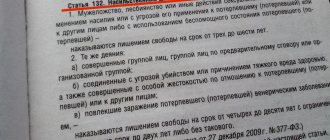The crime, classified as other sexual assault, has much in common with rape. To correctly distinguish between different types of sexual crimes, distinctive characteristics and elements have been established for each of them
Crimes of a sexual nature have always had a special status in criminal law. Legislation should formalize and provide for possible features of this specific area of human relationships. In crime reports, the most common sex crime is rape. Recently, a separate type of crime has been isolated from this concept - other violent acts of a sexual nature.
Distinguish from rape
Due to the great similarity of the two types of crimes, until 1996, other violent acts of a sexual nature meant rape.
After the adoption of relevant amendments to the legislation, the crime was divided into two different types. Differences have been established between the listed acts, which make it possible to separate them. Comparison table:
| Parameter | Rape | Other actions of a sexual nature |
| Gender of the offender | Man | Any gender |
| Victim | Woman | Any gender, including the same gender as the offender |
| Type of sexual violence | Heterosexual. Using physical force and making threats | No vaginal penetration |
The remaining characteristics regulated by Articles 131 and 132 are of a similar nature: an illegal attack by an attacker on a citizen’s sexual integrity and freedom of choice.
Other actions of a sexual nature
⇐ PreviousPage 34 of 96Next ⇒
Other grave consequences - see the material under Art. 131 of the Criminal Code of the Russian Federation
Violence or the threat of its use - see the material under Art. Art. 120, 131 of the Criminal Code of the Russian Federation
Particular cruelty - see material to Art. Art. 63, 105, 131 of the Criminal Code of the Russian Federation
Other actions of a sexual nature
Scientific interpretation
Other actions of a sexual nature are various forms of satisfying sexual passion between a man and a woman or between men, except for natural sexual intercourse and sodomy. For example, anal sex (“coitus per anum”) between a man and a woman, oral sex (“coitus per os”) between a man and a woman or between men, and a woman forcing a man to perform sexual intercourse through the use of violence or the threat of its use (Training- practical commentary on the Criminal Code of the Russian Federation / Under the general editorship of A.E. Zhalinsky. M., 2006. P. 406 (author - E.F. Pobegailo)).
ConsultantPlus: note.
Commentary on the Criminal Code of the Russian Federation (article-by-article) (edited by A.I. Rarog) is included in the information bank according to the publication - Prospect, 2011 (7th edition, revised and expanded).
Other actions of a sexual nature are any means of satisfying sexual desire between men or between a man and a woman, with the exception of natural sexual intercourse and sodomy. This could be, for example, oral sex (“coitus per os”), anal sex (“coitus per anum”), copulation between a man and a woman in a natural form if the coercion comes from the woman. Victims can be both men and women (depending on the nature of the act) (Commentary to the Criminal Code of the Russian Federation / Editor-in-chief A.I. Rarog. M., 2007. P. 233 (author - A.V. Korneeva )).
Other acts of a sexual nature include intercourse per os and per anum, which were previously classified as rape, as well as forcible sexual intercourse, where the victim is a man, and violence or threat comes from a woman (previously did not entail criminal liability) (Commentary to the Criminal Code of the Russian Federation / Responsible editor V.I. Radchenko; scientific editor A.S. Mikhlin. M., 2008. P. 215 (author - A.S. Mikhlin)).
Other actions of a sexual nature are any actions aimed at satisfying sexual passion, regardless of the gender of the persons, with the exception of natural sexual intercourse, sodomy and lesbianism. These can be imitation of sexual intercourse, anal or oral, etc. (Criminal law in the practice of the district court / Edited by A.V. Galakhova. M., 2010. P. 132 (author - S.V. Kuzmin)).
Other actions of a sexual nature should be understood as any other means of forcibly satisfying sexual needs between men, between a woman and a man, between women in other forms other than rape, sodomy and lesbianism, for example, anal or oral contact between a man and a woman, between men. These same cases should include sexual contact between a man and a woman in a natural form in the case of a woman using violence against a man, forcing him to copulate (Commentary to the Criminal Code of the Russian Federation / Editor-in-chief V.M. Lebedev. M., 2013. P. 343 (author - V.P. Stepalin)).
Judicial interpretation
I. committed sexual assault against Iva. Suppressing the victim’s resistance, he inflicted numerous blows on her head and body, causing bodily injuries, which, according to the conclusion of a forensic medical examination, were classified as minor harm to health based on a short-term disorder (lasting up to three weeks). I.’s actions were qualified by the court under Part 1 of Art. 132 of the Criminal Code of the Russian Federation (Salavat City Court of the Republic of Bashkortostan, case No. 1-121/2012).
P. was convicted, including under Part 1 of Art. 131, part 1 art. 132 of the Criminal Code of the Russian Federation. Realizing the criminal intent to commit rape and violent acts of a sexual nature, P., in order to overcome the resistance of the victim G., caused her bodily injuries in the form of bruises on the neck extending to the scalp, accompanied by the development of neurotic depression, which, according to the conclusion of the forensic medical examination, caused harm to health of moderate severity (Altai Regional Court, case No. 233/2012).
Article 133. Compulsion to perform actions of a sexual nature
Other actions of a sexual nature - see the material under Art. 132 of the Criminal Code of the Russian Federation
Financial or other dependence of the victim (victim) - see also the material to Art. 117 of the Criminal Code of the Russian Federation
Financial or other dependence of the victim
(victim)
Scientific interpretation
Another dependence means that the victim is fully or partially dependent on the perpetrator or, for example, lives in his living space. Another dependence may be, for example, official or arise in the learning process between a teacher and a student or between a victim and an official authorized to perform official actions in the interests of the victim. The use of financial or other dependence for the purpose of sexual intercourse, sodomy, lesbianism or other acts of a sexual nature constitutes coercion only in cases where the perpetrator threatens to infringe on the legitimate interests of the victim, for example, dismissal from work, a reduction in salary, deprivation of housing, refusal to give a positive assessment subject to the necessary knowledge, and does not promise to provide benefits and advantages. Just one proposal to perform those specified in Art. 133 of the Criminal Code of the Russian Federation, actions in the presence of material and other dependence do not constitute this crime (Commentary to the Criminal Code of the Russian Federation / Editor-in-chief A.I. Rarog. M., 2004. P. 235 (author - A.V. Korneeva) ).
Minor children, elderly parents, and other disabled dependents who have no other sources of income may be financially dependent (Commentary to the Criminal Code of the Russian Federation / Responsible editor: V.I. Radchenko; scientific editor: A.S. Mikhlin. M. , 2008. P. 216 (author - A.S. Mikhlin)).
Financial dependence is being in full or partial, but significant dependence on the perpetrator on legal grounds or with his voluntary consent (Agafonov A.V. Sexual crimes. M., 2009. P. 235).
Financial dependence means that the victim is dependent (fully or partially) on the perpetrator on the grounds established by law (for example, the financial dependence of a minor stepson on his stepfather, a stepdaughter on her stepmother).
Other dependence of the victim characterizes the restriction of the independence of the victim in any other area of his legal rights and interests, except for material ones. Such dependence may arise due to official relations, the endowment of power relations with the perpetrator, or due to other circumstances (for example, the dependence of a student on a teacher, an athlete on a coach, a patient in need of care on a health worker) (Special Part of the Criminal Code of the Russian Federation. Commentary Judicial practice. Statistics / Under the general editorship of V.M. Lebedev; Responsible editor: A.V. Galakhov. M., 2009. P. 142 (author - E.F. Pobegailo)).
Financial dependence means that the victim (victim) is dependent on the guilty person, lives in his living space without having his own, is his debtor, heir, etc.
Other dependence means that the victim (victim) is in any other, for example official, dependence on the perpetrator. Service dependence is associated with the subordination of the victim (victim) to the guilty person in the service. In addition to official dependence, other dependence may arise in the case of guardianship, trusteeship, etc. (Commentary to the Criminal Code of the Russian Federation / Edited by V.T. Tomin, V.V. Sverchkov. M., 2010. P. 441 (author - Yu.V. Golovlev)).
Financial dependence is being in full or partial, but significant dependence on the perpetrator on legal grounds or with his voluntary consent.
Other dependence is any other dependence, except material, characterized by the lack of full or partial independence, freedom, the presence of subordination in service, work or study, etc. (Commentary to the Criminal Code of the Russian Federation (article-by-article) / Edited by A.I. Chuchaev. M., 2010. P. 376 (author - A.I. Chuchaev)).
Financial dependence refers to the fact that the victim (victim) is fully or partially dependent on the perpetrator, living in a living space that belongs to him, etc. on the basis of the law or with voluntary consent.
Other dependence is understood as any other, but not material, dependence, subordination, control over work, service, study, family dependence, etc., limiting the freedom of choice, for example, between a boss and a subordinate, between a teacher and a student, between an employee and the applicant, between the accused and the investigator, between the athlete and the coach, etc. (Commentary to the Criminal Code of the Russian Federation / Responsible editor: V.M. Lebedev. M., 2013. P. 345 (author - V.P. Stepalin)).
Judicial interpretation
The cassation court overturned the verdict in terms of convicting the person under Art. 133 of the Criminal Code of the Russian Federation with the termination of the case in this part for lack of corpus delicti.
The court found Sh. guilty of committing indecent acts. Investigative authorities qualified his actions under Art. 135 of the Criminal Code of the Russian Federation, but the court reclassified them to Art. 133 of the Criminal Code of the Russian Federation, motivating their decision by the fact that by the time the crime was committed the victims had reached 14 years of age. At the same time, the court did not take into account that the disposition of Art. 133 of the Criminal Code of the Russian Federation connects the presence of the composition with specific actions of a sexual nature, to the commission of which the guilty person forces the victims, and not just under threat, as indicated in the verdict, but by blackmail, threats of destruction, damage or confiscation of property, or using the financial or other dependence of the victims .
The convict did not use this method of influencing the victims, therefore, there is no corpus delicti of this crime (Review of judicial practice of the RF Armed Forces for the first quarter of 1998. Determination N 45-097-97 // ATP “ConsultantPlus”).
Ch. was convicted of committing six counts of forcing his 16-year-old daughter to have sexual intercourse using another addiction of the victim. Ch., in order to obtain his daughter’s consent to have sexual intercourse, abusing his parental rights, realizing that he had a psychological impact on his daughter, expressed his intention to actually infringe on her rights and legitimate interests by prohibiting free movement, meetings and communication with friends, acquaintances during for a long period of time in the event of her refusal to have sexual intercourse with him (Judicial District No. 3 of the Zheleznodorozhny Administrative District of Kursk, Case No. 1-11/3-2011).
G. was convicted by the court under Part 4 of Art. 290, art. 133 of the Criminal Code of the Russian Federation. As an investigator of the Federal Drug Control Service for the Republic of Bashkortostan, during meetings with Yu. he repeatedly demanded that she engage in sexual intercourse with him under the threat of charging her husband with committing a more serious crime (Armed Forces of the Republic of Bashkortostan, case No. 2-28/2011).
Article 135. Depraved acts
Depraved acts
Depraved acts
Scientific interpretation
Depraved actions are those that consist of satisfying the sexual passion of the guilty person, other persons, or those pursuing the goal of arousing or satisfying the sexual instinct of a minor. These include exposing the genitals in the presence of a child, touching the child’s genitals with the penis, masturbation in the presence of a girl, forcing a child to touch the genitals of the perpetrator, etc. So-called lesbian love, when a minor is chosen as a partner, is covered by this crime.
Depraved acts can be expressed in the commission of sexual intercourse (both in natural and perverted form) in the presence of a minor, as well as conversations of a rough sexual nature (Commentary to the Criminal Code of the RSFSR / Responsible editor: V.I. Radchenko; scientific ed. A.S. Mikhlin, I.V. Shmarov. M., 1994. P. 226 (author - S.I. Nikulin)).
These actions are of a sexual nature, aimed at satisfying the sexual lust of the perpetrator or at arousing sexual desire and interest in sexual life in the victim. These actions can be both physical and mental. Physical indecent acts consist of manipulations of a sexual nature, for example, indecent touching (stroking the genitals), inducing masturbation (including by inserting fingers into the vagina), performing sexual acts in the presence of minors, exposing and demonstrating genitals in front of them, etc. Intellectual debauchery comes down, in particular, to cynical conversations on sexual topics, showing pornographic images, giving literature to minors, videotapes that can cause sexual arousal in them, etc. (Educational and practical commentary on the Criminal Code of the Russian Federation / Under the general editorship of A.E. Zhalinsky. M., 2006. P. 411 (author - E.F. Pobegailo)).
Depraved acts can be physical (exposing the genitals of a minor, touching them, exposing the genitals of the perpetrator, committing various indecent acts). These actions must be carried out without the use of violence.
Depraved acts can be of an intellectual nature (demonstration of pornographic objects, holding cynical conversations on sexual topics, showing pornographic films and tape recordings of the same nature) (Commentary to the Criminal Code of the Russian Federation / Editor-in-chief V.M. Lebedev. M., 2007 pp. 359 - 360 (author - A.N. Ignatov)).
The crime in question is realized in the non-violent commission of depraved acts, i.e. actions of a sexual nature aimed at satisfying the sexual passion of the guilty person, as well as arousing sexual desire in the victim and not being sexual intercourse, sodomy or lesbianism. Depending on the way of expression, depraved actions are divided into two types: intellectual and physical. The first type includes: conducting conversations with sexually cynical content, familiarizing with pornographic literature, playing relevant audio and video recordings, demonstrating other porn products (postcards, photographs, drawings, etc.), inciting teenagers to have sexual contacts with each other. The second type includes indecent positions and touching, exposure of the victim's genitals, demonstration of one's own genitals (exhibitionism), artificial stimulation of erogenous zones (masturbation) or sexual contact (for example, sexual intercourse, sodomy, lesbianism) in the presence of a teenager. Based on the systematic interpretation of the criminal law (Articles 135, 132 - 134 of the Criminal Code of the Russian Federation), these include all other (besides sodomy) manifestations of male homosexuality (for example, coitus per os) and all other (besides sexual intercourse) manifestations of heterosexual activity in relation to persons under 16 years of age (for example, coitus per anum, narvasadat, frottazhi, etc.) (Konyakhin V. Depraved actions // Legality. 2008. No. 12).
Non-violent indecent acts include exposing the genitals of the victim or the perpetrator in the presence of the victim, touching the genitals of the victim, performing sexual intercourse in the presence of a minor, breaking the hymen with one's hand, inducing minors to commit sexual acts among themselves. Depraved acts may also consist of showing pornographic films, photographs, etc. to minors. (Commentary to the Criminal Code of the Russian Federation / Responsible editor: V.I. Radchenko; Scientific editor: A.S. Mikhlin. M., 2008. P. 217 (author - A.S. Mikhlin)).
Depraved actions are those aimed at satisfying the sexual passion of the guilty person or at arousing unhealthy sexual desire in a minor, not related to sexual intercourse, sodomy, lesbianism or other actions of a sexual nature. Such actions are characterized by the fact that they awaken unhealthy sexual interest in minors, have a negative, corrupting effect on their development and education, forming the rules of obscene, immoral behavior in relations between the sexes, etc.
Depraved acts can be both physical and intellectual.
Typical physical lewd acts are exposing the genitals of the perpetrator or victim, touching them, groping them, taking obscene forms, committing obscene gestures, sexual intercourse, other acts of a sexual nature in the presence of a minor, inducing onanism, masturbation, etc.
Typical depraved acts of an intellectual nature are displaying pornographic materials, objects, audio, film or video recordings, images of a pornographic nature, reading pornographic literature, conducting conversations, conversations, stories on sexual topics of a cynical nature, etc. (Commentary to the Criminal Code of the Russian Federation / Responsible editor: V.M. Lebedev. M., 2013. P. 350 - 351 (author - V.P. Stepalin)).
⇐ Previous34Next ⇒
Specifics of the crime
Violent actions of a sexual nature are non-standard ways of satisfying natural human needs that were obtained after voicing threats or violent actions.
There are several types of crimes of a sexual nature, among which NDHS is particularly dangerous to the public. The reasons for this are a large percentage of secrecy and the lack of receipt of applications from victims to law enforcement agencies, which is caused by the following reasons:
- Lack of faith in the possibility of bringing the criminal to justice.
- Fear of publicity.
- Fear of condemnation from society. Similar fears are common among male victims.
Features of the crime
Among similar atrocities directed against sexual integrity, violent acts stand out as a factor of increased danger. If we analyze the statistics for the country as a whole, few such crimes are committed when compared, for example, with rape.
This is due to the following reasons:
- Low percentage of requests for help from investigative authorities. Victims prefer to hush up the fact of violence, fearing publicity. As a result, criminals develop a feeling of impunity, which is an incentive to commit similar atrocities.
- More serious consequences. Sexual abuse committed in an unnatural form causes severe psycho-emotional trauma, therefore, fearing ridicule, victims do not admit that they have become victims of violence, even to close people.
It is noteworthy that representatives of the stronger sex are more vulnerable in this regard.
Composition of the act
Other violent actions relate to specific types of crimes, and therefore have a special composition:
Have a question for a lawyer? Ask now, call and get a free consultation from leading lawyers in your city. We will answer your questions quickly and try to help with your specific case.
Telephone in Moscow and the Moscow region: +7
Phone in St. Petersburg and Leningrad region: +7
Free hotline throughout Russia: 8 (800) 301-39-20
- Object of illegal action. This category includes sexual integrity and freedom of sexual choice of a citizen. The first point means protection from sexual assault, the second the ability to choose a sexual partner at your own discretion.
- Objective side. The actions of a criminal, expressed in violence or uttering threats of violence, which are aimed at satisfying their sexual desires. Article 132 defines the nature of the criminal act as “lesbianism, sodomy or other violent acts.” The listed actions are carried out with physical violence or voicing threats. NDHS are almost always accompanied by serious harm to health of varying severity.
- Intent. Crimes of this kind are always accompanied by direct intent. The attacker understands the illegality of his actions and is aware of the possible consequences of the crime being committed, but at the same time he wants and carries out an illegal act. The motive for committing NDHS does not qualify such an act in any way, but is necessarily taken into account when determining the penalty.
- The subject (criminal) of the acts. A man or woman over 14 years of age. The gender of the offender is taken into account solely to determine the type of crime committed. When determining punishment and liability, the physical condition of the attacker is not taken into account.
Features of violent actions
Sexual acts with the use of violence are a surrogate or unnatural method of satisfying one’s natural needs. Moreover, committed through threats and violence. NDSH are very dangerous for two reasons:
- victims do not contact the police because they do not believe that the offender will be punished, or because they are afraid of public condemnation or publicity;
- the consequences of NDSH can not only cause harm physically, but also have a strong emotional impact and harm the psyche.
Categories of crime
Article 132, which regulates the NDHS, consists of five parts, 4 of them relate to the definition of mitigating and aggravating circumstances. Crimes of this kind are divided into several types, which are listed below.
Victim status
The most severe punishment is provided for other violent actions if:
- They were carried out by a group of criminals who planned the criminal act in advance.
- The victim was a teenager less than 14 years old.
- The perpetrator has a criminal record of a similar nature.
State of the victim
Under certain circumstances, if the crime was committed without the use of violence, it will be qualified under Article 132. The reason for this is the helpless state of the victim. Such conditions include:
- Dream.
- Loss of consciousness.
- Any type of intoxication.
- Disability.
- Age of the victim.
Circumstances of the crime
The circumstances of the crime are understood as the methods used by the rapist to achieve the desired goals. The elements of violence in the process of which a threat of physical force is expressed are separately determined.
Severity of consequences
When committing NDHS, the victim in any case suffers emotional trauma. Physical harm can have varying degrees of severity and is established according to the following gradation:
- In the process of committing NDHS, the victim becomes infected with sexually transmitted diseases, which can be cured.
- Causing significant damage to health, which is expressed in infection with HIV or other dangerous infections that can cause significant harm to health in a short period of time.
- Death.
This is interesting
According to Bulgarian legislation, the assessment of the corpus delicti requires taking into account the commission of an unlawful act in relation to the victim, who was in a helpless state. Additionally, responsibility for bringing a person into such a state is prescribed. This formulation (as a number of experts note) is more complete and correct.
Another interesting difference between Bulgarian legislation and domestic legislation is the identification of special circumstances that increase the guilt of the rapist. These include situations where two or more minors became victims. The case is considered especially serious if, as a result of the crime, a minor citizen attempted to commit suicide.
Possible punishment
There are not many articles in the current Criminal Code that provide for the possibility of imposing life imprisonment for a crime committed under aggravating circumstances, including Art. 132.
It provides only real sentences, which can vary from 3 to 20 years. As an additional punishment, an attacker for other violent actions may be given one of the following measures:
- A ban on the ability to officially carry out certain types of activities.
- After the full serving of the sentence, restriction of freedom is imposed for a certain period.
In theory, there are circumstances that should mitigate the punishment. They relate exclusively to the act committed, and not to the identity of the criminal. In practice, the court accepts a mitigating circumstance when determining punishment for such crimes only in exceptional cases.
The severity of the consequences of the crime
Acts of a sexual nature not only cause emotional harm to the victim. There are also physical consequences, which are punished depending on the severity:
- Infection with venereal diseases that can be cured (Article 132 of the Criminal Code, clause “B”, part 2). This is a prison term of 4 to 10 years with a possible suspended sentence of up to two years.
- Causing serious harm to health or contracting HIV infection, AIDS and other incurable sexually transmitted diseases, even if they cause great harm to health in a short period of time (syphilis). Serious consequences also include incitement to suicide, resulting infertility or impotence (Article 132 of the Criminal Code, paragraph “B”, part 3). This is a prison term of up to 15 years.
- The death of the victim caused by sexual assault (Article 132 of the Criminal Code, paragraph “A”, part 4). This is a prison term of 12 to 20 years. At the same time, it is prohibited to work in specific positions or perform certain activities for a period of up to 20 years. Plus a possible additional conditional restriction of freedom for up to 2 years.








